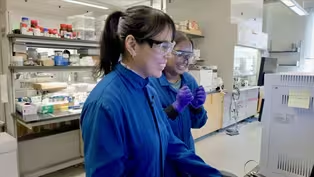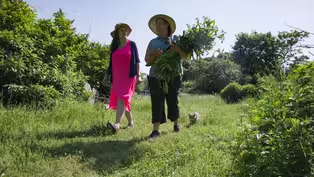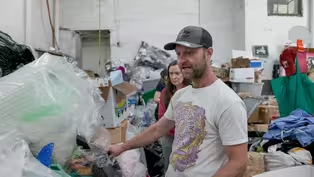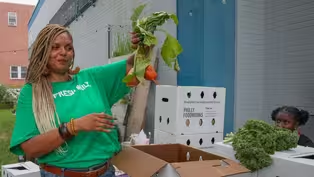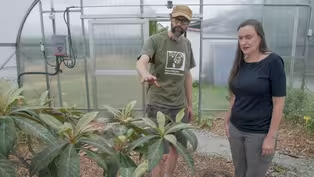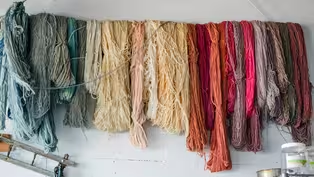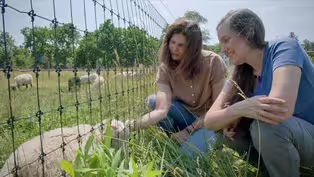WHYY Series
How flax can slow down fashion
Special | 1m 57sVideo has Closed Captions
Fields of flax with their tiny blue flowers once thrived in rural Pennsylvania.
Fields of flax with their tiny blue flowers once thrived in rural Pennsylvania. The straight thin stalks were harvested to make linen. As a way to combat the climate impact of fossil fuel based textiles – the PA Flax Project is working to jump start the industry to produce a natural fiber that improves soil health, uses no pesticides and protects waterways.
Problems playing video? | Closed Captioning Feedback
Problems playing video? | Closed Captioning Feedback
WHYY Series is a local public television program presented by WHYY
WHYY Series
How flax can slow down fashion
Special | 1m 57sVideo has Closed Captions
Fields of flax with their tiny blue flowers once thrived in rural Pennsylvania. The straight thin stalks were harvested to make linen. As a way to combat the climate impact of fossil fuel based textiles – the PA Flax Project is working to jump start the industry to produce a natural fiber that improves soil health, uses no pesticides and protects waterways.
Problems playing video? | Closed Captioning Feedback
How to Watch WHYY Series
WHYY Series is available to stream on pbs.org and the free PBS App, available on iPhone, Apple TV, Android TV, Android smartphones, Amazon Fire TV, Amazon Fire Tablet, Roku, Samsung Smart TV, and Vizio.
Providing Support for PBS.org
Learn Moreabout PBS online sponsorshipMore from This Collection
In this video series, WHYY’s Senior Climate Reporter Susan Phillips profiles innovative people working locally to cool the earth, heal the planet and help neighbors thrive.
Using chemistry to recycle clothes
Video has Closed Captions
Less than one percent of our clothes get recycled. (1m 32s)
The simple act of planting native species
Video has Closed Captions
Jennie Love shows us the benefits of native plants at her flower farm in Northwest Philadelphia (1m 58s)
Video has Closed Captions
By re-using raw materials, we keep trash out of the landfill. (1m 35s)
How a plant-based diet can help the planet
Video has Closed Captions
Eat your vegetables! It’s a common refrain. (1m 43s)
Growing bananas in Philly? Preparing for a warming future
Video has Closed Captions
As the climate changes so do our growing seasons. (1m 57s)
Video has Closed Captions
Synthetic dyes pollute waterways across the globe. Many are petroleum based and their production hel (1m 32s)
A climate solution that keeps us warm and dry
Video has Closed Captions
Industrial farms damage waterways and contribute to climate change. (1m 34s)
Providing Support for PBS.org
Learn Moreabout PBS online sponsorshipFlax is such an amazing little plant it's used to make linseed oil which is a natural wood preserver flax seeds flax oil which are really high in omega-3s come from this plant as well as the natural fiber linen all from this useful little plant we're at a farm in Chester County Pennsylvania where four acres are devoted to growing flax and it's ready to be harvested it's part of a pilot project supported by the USDA flax was actually a very important crop in Pennsylvania in colonial times today a group of people are working to bring it back it doesn't need fertilizer it doesn't need irrigation so just with some sun and the humidity and rain it grows really well meaning that it lends itself well to organic fiber production and it can be processed from field to fiber 100% mechanically using no chemicals at all because it's 100% plant-based natural fiber that automatically makes it better than a synthetic because it can be part of a regenerative agricultural cycle as opposed to an extractive system like drilling for oil which is what synthetic fibers are made out of they're oil based so when thinking about our clothes our wardrobe what's your advice for anyone wanting to cut their carbon footprint I'd say choose natural fibers and I would say choose linen it's a fabric that lasts a very long time it's durable and at the end of its long useful life it can be turned into a rag and once it becomes threadbare you can actually compost it and it will simply go back to the soil because it's 100% plant based we've got a long way to go before natural fibers like flax dominate our wardrobe but the PA Flax Project wants to put 12,000 acres of flax into production as a way to create a more sustainable clothing industry

- News and Public Affairs

Top journalists deliver compelling original analysis of the hour's headlines.

- News and Public Affairs

FRONTLINE is investigative journalism that questions, explains and changes our world.












Support for PBS provided by:
WHYY Series is a local public television program presented by WHYY
